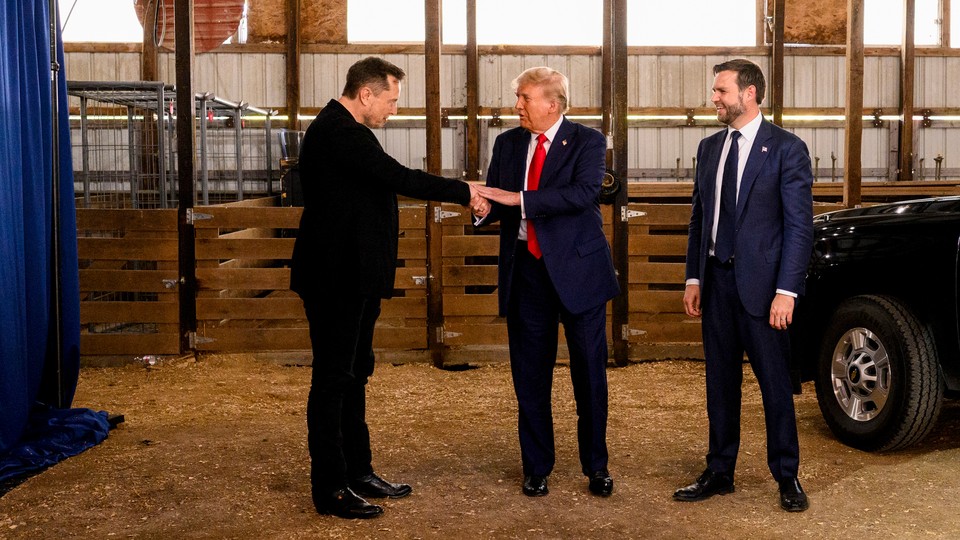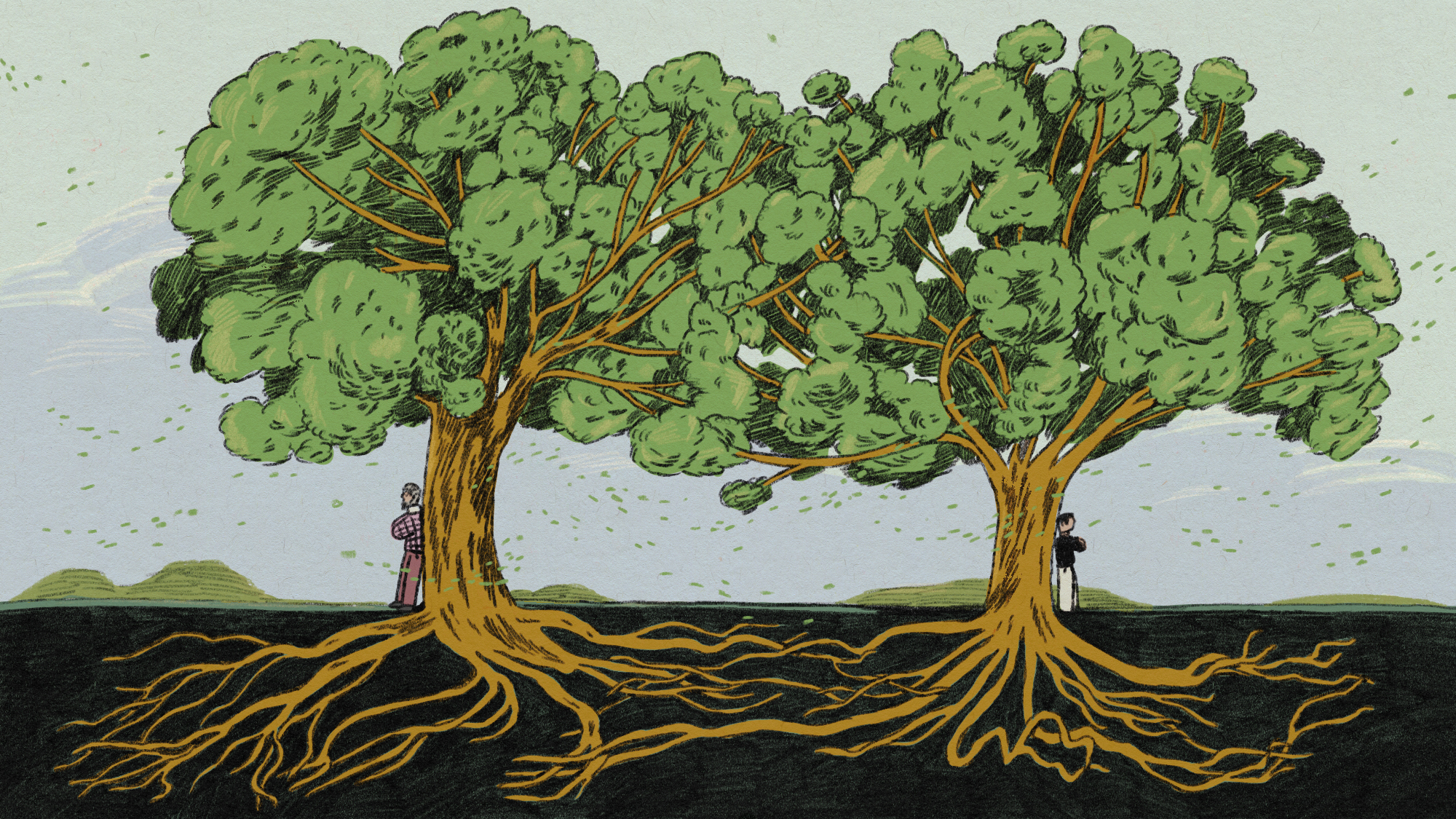The Phony Populism of Trump and Musk
9 min read
This is an edition of The Atlantic Daily, a newsletter that guides you through the biggest stories of the day, helps you discover new ideas, and recommends the best in culture. Sign up for it here.
A Donald Trump rally is always a strange spectacle, and not only because of the candidate’s incoherence and bizarre detours into mental cul-de-sacs. (Journalists have faced some criticism for ignoring or recasting these moments, but The New York Times, for one, has finally said that the candidate’s mental state is a legitimate concern.) Trump’s rally on Saturday in Butler, Pennsylvania, was a hall-of-fame entry in political weirdness: Few survivors of an attempted assassination hold a giant lawn party on the spot where they were wounded and someone in the crowd was killed.
The candidate’s tirades are the most obviously bizarre part of his performances, but the nature of the gathering itself is a fascinating paradox. Thousands of people, mostly from the working and middle class, line up to spend time with a very rich man, a lifelong New Yorker who privately detests the heartland Americans in his audience—and applaud as he excoriates the “elites.”
This is a political charade: Trump and his running mate, the hillbilly turned multimillionaire J. D. Vance, have little in common with most of the people in the audience, no matter how much they claim to be one of them. The mask slips often: Even as he courts the union vote, Trump revels in saying how much he hated having to pay overtime to his workers. In another telling moment, Trump beamed while talking about how Vance and his wife both have Yale degrees, despite his usual excoriations of top universities. (He always carves out a glittering exception for his own days at the University of Pennsylvania, of course.)
Trump then welcomed the world’s richest man, Elon Musk, to the stage. Things got weirder from there, as Musk—who, it should be noted, is 53 years old—jumped around the stage like a concertgoing teenager who got picked out of the audience to meet the band. Musk then proceeded to explain how democracy is in danger—this, from a man who has turned the platform once known as Twitter into an open zone for foreign propaganda and has amplified various hoaxes. Musk has presented himself on his own platform as a champion of the voiceless and the oppressed, but his behavior reveals him as an enemy of speech that isn’t in his own interest.
What happened in Butler over the weekend, however, was not some unique American moment. Around the world, fantastically wealthy people are hoodwinking ordinary voters, warning that dark forces—always an indistinct “they” and “them”—are conspiring to take away their rights and turn their nation into an immense ghetto full of undesirables (who are almost always racial minorities or immigrants or, in the ideal narrative, both).
The British writer Martin Wolf calls this “pluto-populism,” a brash attempt by people at the top of the financial and social pyramid to stay afloat by capering as ostensibly anti-establishment, pro-worker candidates. In Britain, former Prime Minister Boris Johnson dismissed the whole notion of Brexit behind closed doors, and then supported the movement as his ticket into 10 Downing Street anyway. In Italy, a wealthy entrepreneur helped start the “Five-Star Movement,” recruiting the comedian Beppe Grillo to hold supposedly anti-elitist events such as Fuck-Off Day; they briefly joined a coalition government with a far-right populist party, Lega, some years ago. Similar movements have arisen around the world, in Turkey, Brazil, Hungary, and other nations.
These movements are all remarkably alike: They claim to represent the common voter, especially the “forgotten people” and the dispossessed, but in reality, the base voters for these groups are not the poorest or most disadvantaged in their society. Rather, they tend to be relatively affluent. (Think of the January 6 rioters, and how many of them were able to afford flights, hotels, and expensive gear. It’s not cheap to be an insurrectionist.) As Simon Kuper noted in 2020, the “comfortably off populist voter is the main force behind Trump, Brexit and Italy’s Lega,” a fact ignored by opportunistic politicians who instead claim to be acting on behalf of stereotypes of impoverished former factory workers, even if there are few such people left to represent.
One of the pioneers of pluto-populism, of course, is the late Italian Prime Minister Silvio Berlusconi, a rake and a grifter who stayed in office as part of staying out of jail. That strategy should sound familiar to Americans, but even more familiar is the way the Italian scholar Maurizio Viroli, in a book about Italian politics, notes how Berlusconi deformed Italian democracy by seducing its elites into joining the big con against the ordinary voter: Italy, he wrote, is a free country, but Viroli calls such freedom the “liberty of servants,” a sop offered to people who are subjects in a new kind of democracy that is really just the “court at the center of which sits a signore surrounded by a plethora of courtiers, who are in turn admired and envied by a multitude of individuals with servile souls.”
The appeals of the pluto-populists work because they target people who care little about policy but a great deal about social revenge. These citizens feel like others whom they dislike are living good lives, which to them seems an injustice. Worse, this itching sense of resentment is the result not of unrequited love but of unrequited hate: Much like the townies who feel looked down upon by the local college kids, or the Red Sox fans who are infuriated that Yankees fans couldn’t care less about their tribal animus, these voters feel ignored and disrespected.
Who better to be the agent of their revenge than a crude and boorish magnate who commands attention, angers and frightens the people they hate, and intends to control the political system so that he cannot be touched by it?
Musk, for his part, is the perfect addition to this crew. Rich beyond imagination, he still has the wheedling affect of a needy youngster who requires (and demands) attention. Like Trump, he seems unable to believe that although money can buy many things—luxury digs, expensive lawyers, obsequious staff—it cannot buy respect. For people such as Musk and Trump, this popular rejection is baffling and enraging.
Trump and those like him thus make a deal with the most resentful citizens in society: Keep us up in the penthouses, and we’ll harass your enemies on your behalf. We’ll punish the people you want punished. In the end, however, the joke is always on the voters: The pluto-populists don’t care about the people cheering them on. Few scores will truly be settled, and life will only become harder for everyone who isn’t wealthy or powerful enough to resist the autocratic policies that such people will impose on everyone, regardless of their previous support.
When the dust settles, Trump and Vance will still be rich and powerful (as will Musk, whose fortune and power transcends borders in a way that right-wing populists usually claim to hate). For the many Americans who admire them, little will change; their lives will not improve, just as they did not during Trump’s first term. Millions of us, regardless of whom we voted for, will have to fend off interference in our lives from an authoritarian government—especially if we are, for example, a targeted minority, a woman in need of health care, or a member of a disfavored immigrant community.
This is not freedom: As Viroli warned his fellow citizens, “If we are subjected to the arbitrary or enormous power of a man, we may well be free to do more or less what we want, but we are still servants.”
Related:
- Elon Musk bends the knee to Donald Trump.
- Elon Musk has reached a new low.
Here are four new stories from The Atlantic:
- What going on Call Her Daddy did for Kamala Harris
- How Jack Smith outsmarted the Supreme Court
- Third-trimester abortions are rare—but they are happening in America.
- October 7 created a permission structure for anti-Semitism, Dara Horn argues.
Today’s News
- Hurricane Milton has strengthened into a Category 5 storm. It is expected to make landfall on Wednesday near the Tampa Bay, Florida, region.
- The Supreme Court allowed a lower court’s decision on Texas’s abortion case to stand; the decision ruled that Texas hospitals do not have to perform emergency abortions if they would violate the state’s law.
- Philip B. Banks III, the deputy mayor for public safety in New York City and one of Mayor Eric Adams’s top aides, has resigned. His phones were seized by federal investigators last month as part of a probe into bribery and corruption allegations.
Dispatches
- The Books Briefing: In a new short story, Lauren Groff captures the precise moment when a friendship changes forever, Walt Hunter writes.
- The Wonder Reader: Henry David Thoreau once argued in The Atlantic that autumn doesn’t get enough attention. “This season, I’m wondering whether Thoreau had a point,” Isabel Fattal writes.
Explore all of our newsletters here.
Evening Read

Couples Therapy, but for Siblings
By Faith Hill
Cam and Dan Beaudoin’s three-decade-old problem began when they were kids. Dan would follow his big brother around. Cam, who’s about three years older, would distance himself. Dan would get mad; Cam would get mad back. Although their mom assured them that they’d be “best friends” some day, nothing much changed—until about three years ago, when a fight got so bad that the brothers stopped talking to each other completely. Dan left all of their shared group chats and unfriended Cam on LinkedIn.
But the brothers, who didn’t speak for about a year and a half, started to understand the gravity of this separation.
Read the full article.
Reflections on October 7
Today marks one year since Hamas’s attack on Israel and the start of the subsequent Israel-Hamas war in Gaza. Below, we’ve compiled some of our writers’ recent reporting, analysis, and reflection:
- The war that would not end: In the year since October 7, the Biden administration has focused on preventing the escalation of a regional war in the Middle East, Franklin Foer reports. But it has failed to secure the release of Israeli hostages or end the fighting in Gaza.
- Gaza’s suffering is unprecedented: “In my brother’s story, you can get a small glimpse of what the most destructive war in Palestinian history has meant in human terms,” Ahmed Fouad Alkhatib writes.
- “How my family survived the October 7 massacre”: “We heard shouting in Arabic outside our house—a commander telling one of his men to try to break in. We had woken up to a nightmare: The border had been breached. Hamas was here,” Amir Tibon writes in an article adapted from his new book, The Gates of Gaza.
- A naked desperation to be seen: In books about the aftermath of October 7, Israelis and Palestinians seek recognition for their humanity, Gal Beckerman writes.
- The Israeli artist who offends everyone: Long a fearless critic of Israel, Zoya Cherkassky-Nnadi has made wrenching portraits of her nation’s suffering since October 7, Judith Shulevitz writes.
Culture Break

Watch. The return of Nate Bargatze and his now-classic George Washington sketch points to what really works about Saturday Night Live, Amanda Wicks writes.
Grow up. Rather than sneak your greens into a smoothie, it’s time to eat your vegetables like an adult, Yasmin Tayag writes.
Play our daily crossword.
Stephanie Bai contributed to this newsletter.
When you buy a book using a link in this newsletter, we receive a commission. Thank you for supporting The Atlantic.



